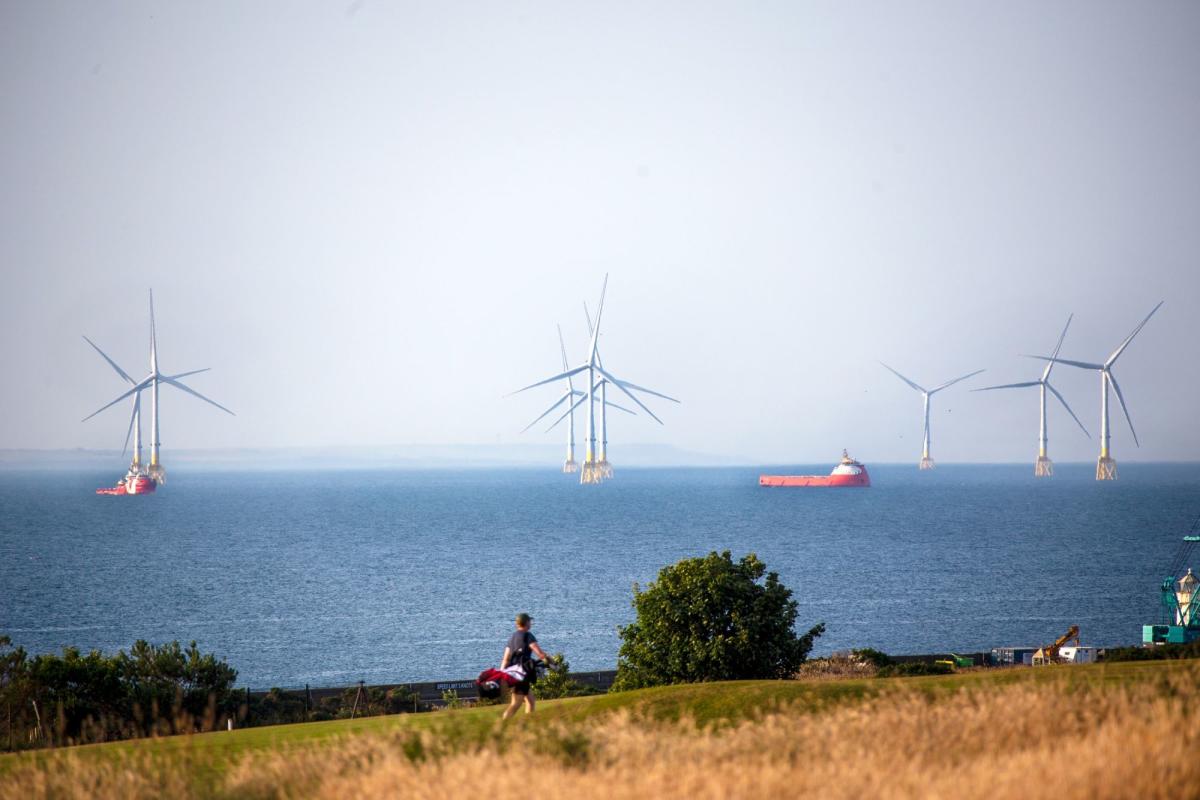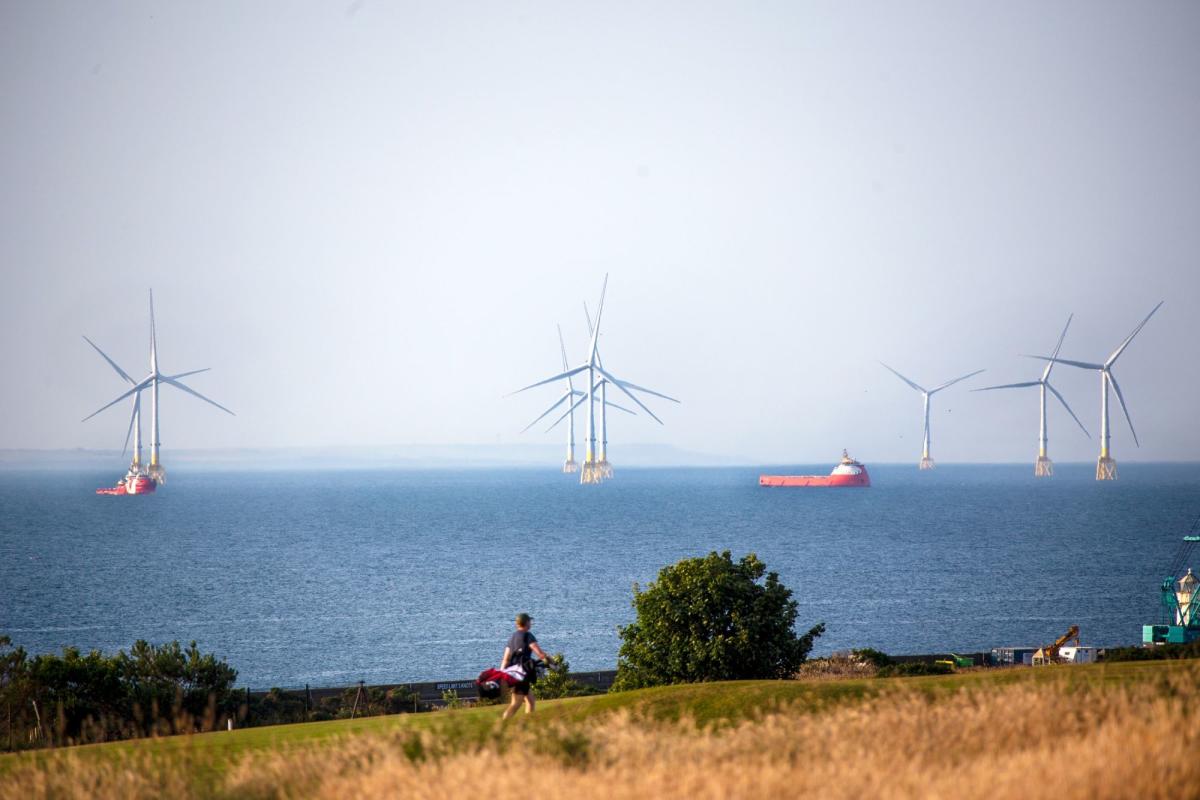
(Bloomberg) — Al Gore, the former US vice president turned climate campaigner, said any Republican Party efforts to force through policies that penalize green investors would be at odds with market forces that are ultimately more powerful than politics.
Most Read from Bloomberg
“Markets are making a different decision,” Gore said in an interview with Bloomberg Television’s Francine Lacqua in Egypt on Wednesday. “We’re seeing a massive movement toward more climate friendly policies.”
Markets are “in the early stages of a sustainability revolution,” Gore said, repeating a line he’s used before to describe this point in history. “So whatever politicians in different countries want to opine on, we’re seeing business and investors and markets move towards solutions for the climate crisis.”
Gore made the comments on the COP27 climate summit’s Finance Day, which will be a leaner affair than in Scotland last year after a number of prominent chief executives including BlackRock Inc.’s Larry Fink and Citigroup Inc.’s Jane Fraser opted to stay away. That’s as climate finance faces growing hurdles.
Earlier in the day, Mark Carney, the former Bank of England Governor and co-chair of the world’s biggest climate finance coalition, urged governments to “align financial regulation with net zero” by making net zero transition plans mandatory.
An energy crisis and a changing political landscape in the US are making it harder for banks and investors to turn their backs on fossil fuels. Financial firms are also increasingly nervous of the legal ramifications of joining net-zero alliances, with some in the US claiming that such goals are at odds with fiduciary duties. And in some cases, climate-finance alliances have even been likened to cartels.
Read More: Blackstone, Pimco Sidestep Net-Zero Group Even After Concessions
Those legal risks may intensify, depending on the outcome of midterm elections in the US. But there’s also a legal risk involved in making climate promises that firms don’t live up to.
“Firms should be wary of being caught in the riptide of unrealistic ambitions as it may expose them to both litigation and reputational risks if they don’t meet these commitments,” Sonali Siriwardena, partner and global head of ESG at Simmons & Simmons in London.
(GFANZ is co-chaired by former Bank of England Governor Mark Carney and Michael R. Bloomberg, the founder of Bloomberg News parent Bloomberg LP.)
Read More: 10 things to watch at the COP27 summit
Highlights:
-
Click here to read the highlights from talks on Tuesday
-
China delivers blow to climate with new emissions deadline
-
Satellite spots methane cloud near Iran oil and gas facilities
-
Mark Carney sees ‘wall of opportunity’ for energy investors
-
UN panel calls out ‘greenwashers’ and seeks net-zero regulation
-
EU Lawmakers reach deal on climate goals outside carbon market
-
Click here to get read about Bloomberg Green at COP27
Here are the latest developments. All times Egypt.
China Climate Envoy Xie Says He Met With John Kerry at COP27 (12:01 pm)
China Climate Envoy Xie Zhenhua says he met with John Kerry, US special climate envoy, for unofficial talks, during the COP27 climate summit in Egypt on Wednesday.
The meeting is a potential sign that relations are warming despite a formal suspension of bilateral negotiations on the issue earlier this year.
Beijing announced it was halting negotiations with the US over climate and several other issues in August, after US House Speaker Nancy Pelosi visited Taiwan, the self-governing island over which China claims sovereignty.
HSBC’s Quinn Tells Egypt Not to Be ‘Discouraged’ by Green Bond Cost (11:55 am)
HSBC CEO Noel Quinn responded to comments from Egypt’s finance minister, Mohamed Maait, that his country had to pay more to issue green debt than regular bonds. “Don’t be discouraged,” said Quinn, whose bank was one of the arrangers of the issuance.
Costs will go down with “familiarity” and with the establishment of global disclosure methodologies, he said. “When you put the label green next to a bond everyone wants reassurance,” he said.
NinetyOne CEO Says Emerging Markets in a Strong Position (11:40 am)
Emerging markets are in a strong position, according to Hendrik du Toit, CEO and founder of NinetyOne Plc. They stand to benefit from political and economic uncertainty in the developed world, which could cause a shift in available climate finance, he said in an interview with Bloomberg Television on Wednesday.
There’s also a “very exciting and relatively low risk opportunity in the debt that finances the energy transition,” he said. This is because most companies that need to transition are carbon heavy but cashflow strong, offering reasonably well-priced debt and the opportunity to play a positive role. “Transition debt is where we think the action will be,” du Toit said.
IEA Says OPEC+ Oil Cut is Hurting Emerging Markets (11:20 am)
Last month’s decision by OPEC+ to reduce oil production was “definitely not helpful,” according to the International Energy Agency, which advises rich countries.
“It is causing inflation and economic weakness, especially in developing economies,” Executive Director Fatih Birol said to Bloomberg TV. Energy-importing countries in Africa, Asia and Latin America will suffer, he said.
Europe’s managed to refill its natural gas storage sites for this winter, but next year will be tougher, Birol said. That’s because the continent may have to make do without any supplies from Russia and because demand in China could pick up as it eases coronavirus restrictions.
While the world needs to invest more in renewables, it must continue investing in fossil fuels to enhance energy security, he said.
Germany, France Sign Deal to Give South Africa $604 Million in Climate Finance (11:15 am)
South Africa’s government signed loan agreements with French and German public development banks to support its efforts to shift from coal toward cleaner energy sources.
Agence Française de Développement and Kreditanstalt für Wiederaufbau extended concessional loans of €300 million ($302 million) each to the South African government as part of an $8.5 billion climate finance deal it was offered by wealthy nations at the COP26 talks in Glasgow last year, the National Treasury said in a statement Wednesday.
The plan is seen as a blueprint for other coal-dependent developing nations to cut greenhouse-gas emissions.
ECB Urges Banks to ‘Step Up Their Game’ on Climate Risk (11:07 am)
The European Central Bank is aware of the need for “further action to incorporate the consequences of the ongoing climate and environmental crises into our work,” said Frank Elderson, ECB executive board member.
The ECB’s interactions with banks show they’re making progress, he said. But “despite the progress we have seen, I will continue to stress that the banks under our supervision need to step up their game and truly manage climate-related and environmental risks in the same way we expect them to manage any other material risk,” Elderson said.
Malpass Says Developing Countries Are Facing Economic Crisis (10:22 am)
David Malpass, president of the World Bank, said heavy debt burdens combined with inflation and the fallout from climate change are pushing the developing world into an economic crisis.
The World Bank reached $32 billion in climate finance this year, which is a record and was “well above our Glasgow target,” he said. “We want to dramatically increase the number and size of projects that reduce greenhouse gas emissions.”
Georgieva Says Climate Success Depends on Finance ‘Incentives’ (10:15 am)
Kristalina Georgieva, managing director of the International Monetary Fund, said the finance needed to address climate change and the energy transition will not flow without changing the incentives for financiers. And “the best incentive we have to shift from high carbon intensity to low carbon intensity is to price carbon,” she said.
The average price of carbon globally is $5 but to be at the level that “changes investment and consumer behavior” it will have to go up to at least $75 a tonne by 2030, she said.
“Adam Smith, the founder of economics, said it: the butcher and the baker don’t feed you out of the generosity of their hearts, they feed you for self interest,” she said. “So we have to create the self interest for decarbonization.”
Conservative Estimate Puts 2030 Financing Gap at $2.4 Trillion (9:51 am)
There’s a gap in financing of around $2.4 trillion, compared with what’s needed by 2030, and that represents “the most conservative figure,” said Mahmoud Mohieldin, UN Climate Change High-Level Champion for COP27.
Serious debt reduction mechanisms are needed, while multilateral development banks and international finance institutions need to play a greater role in supporting such efforts, he said.
Mohieldin also said he is “very happy to see a chapter of GFANZ established for Africa with serious consideration of being practical and supporting a pipeline of projects.”
DTEK Needs ‘Billions’ of Dollars to Fix Power Grid (9:45 am)
Ukraine’s biggest private power producer, DTEK, said it’s running out of equipment to fix power stations damaged by Russian missile attacks.
“We need millions of dollars-worth of equipment for immediate fixes and billions for the long-term, deep repairs of the grid,” Chief Executive Officer Maxim Timchenko said in an interview at the COP27 climate conference in Egypt. “We appeal to countries and companies to help us.” DTEK has had to halt power exports to the rest of Europe to focus on maintaining domestic supplies, he said.
Africa Recognizes Need to Pursue Green Growth (8:43 am)
Africa’s common position at the COP27 summit recognizes the need for growth alongside the duty to provide electricity to its 600 million inhabitants who don’t have access to energy, UN Economic Commission for Africa acting Executive Secretary Antonio Pedro said. That energy shortfall is the reason the continent is promoting natural gas as a “transition fuel,” Pedro said in an interview with Bloomberg Television.
Net-Zero Asset Managers Group Says Alliance Has Grown to 291 (8:00 am)
The Net Zero Asset Managers initiative says 86 investors have set initial targets for the proportion of assets that will be managed in line with achieving net zero emissions by 2050 or sooner, with the total number of asset managers committing to net zero rising to 291.
That brings to 169 the total number of managers with such targets, collectively representing over $55 trillion in assets under management, according to a statement by NZAMi on Wednesday. New signatories include Capital Group, Northern Trust and AllianceBernstein.
Climate Change Could Cost Africa Two Thirds of Its GDP Growth (2:01 am)
Global warming could slash Africa’s economic growth by two thirds by the end of the century unless significant investment is made in climate adaptation, a new study shows.
Current climate policies will likely see temperatures exceed the pre-industrial average by 2.7C, curbing African growth rates 20% by 2050 and 64% by 2100, Christian Aid said in a report released Wednesday. Even a 1.5C rise in temperatures would reduce growth rates by 34% by the century’s end, it said.
While Africa is responsible for about 4% of planet-warming emissions, it’s already being hit hard by a changing climate. Devastating cyclones and floods have battered southeast and West Africa this year while the Horn of Africa is in the midst of its worst drought in four decades.
–With assistance from Nicholas Comfort, Antony Sguazzin, Paul Wallace, Salma El Wardany, Yousef Gamal El-Din, Paul Richardson, Akshat Rathi and Siobhan Wagner.
Most Read from Bloomberg Businessweek
©2022 Bloomberg L.P.




